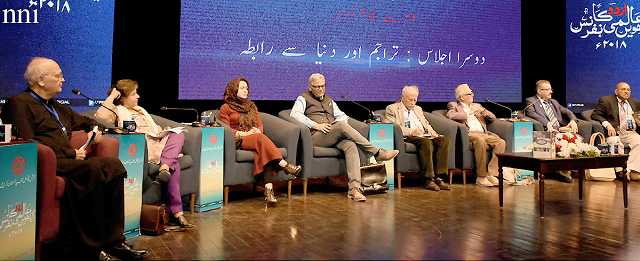Panellists talk about connecting the world through the art of translation
The translators’ contribution to Urdu language was appreciated by literati

Second Session of the 11th International Urdu Conference. PHOTO: NNI
This was said in the second session of the 11th International Urdu Conference titled “Translations and the Connection with the World”. The session took place at Arts Council of Pakistan on Sunday. The panellists were Raza Ali Abidi from London, Arif Naqvi from Germany, Khalil Tooqar from Turkey, Arshad Farooq from Finland, Syed Naqvi from America, Wafa Yazdan Mansh from Iran and Bushra Iqbal from Germany. The session was moderated by Anjum Rizvi.
11th Urdu Conference opens at Arts Council
Talking about the status of Urdu translations in Iran, Mansh said, “Several compositions in Urdu have been translated into Persian including Shibli Nomani and many short stories and poems.” She mentioned that there were many active students in Iran who were interested in exploring other languages. “One of the students translated the composition of Intizar Hussain but no one knew what she did,” she said adding that the embassies do not support such talents. Persian and Urdu are closely tied with the safarnamay [travelogue] and the cultural history of the countries.
“Only a few people cannot translate the amount of literature there is to share. Literati and students of both countries need to work together on them,” Mansh suggested. She also expressed her view that knowing two languages is double responsibility. The scholars that are native Urdu speakers have the responsibility to take a step since they have a hold on the language. “Education institutions must come together to work on the advancement of both languages.”
Iqbal, giving her views on the government support, said that the major constraint in Urdu translations is the lack of support from the Government of Pakistan. “Despite many compositions of Faiz Ahmed Faiz and Kishwer Naheed translated in German, Urdu translated publications still go through a difficult time when it comes to publishers in Germany as they have strict committees to go through of.”
Meanwhile, Syed Naqvi said that in America, not as much work is being carried out as should be. He remarked that the translations must go beyond just stories; nursing and other subjects should also be translated in Urdu.
Reflecting upon his experience in Germany, Naqvi spoke about several Urdu compositions that have been translated in German and broadcast on German radios. “The problem begins where the translations go through two languages, as that is when it loses the value. Most of these translations are from Urdu to English and then to German. The essence doesn’t remain the same,” Naqvi remarked, adding that the translator must not only know both languages but the cultural contexts of both as well.
Translating Urdu compositions to German becomes difficult as the German culture wants straight-forward writing with messages of humanity and peace but the Urdu compositions are based on an entirely different context.
Tooqar shared his views about Urdu to Turkish translations and said that in Turkey they don’t have much translation because of the financial issues but the poetry of Allama Iqbal is much demanded as they love Iqbal and his poetry. He suggested that institutions of both the countries should come together and work on this.
Literati recognise Fehmida Riaz’s contribution to children’s literature
Giving his views about the topic, Farooq said, “We are working on a translation from Finish literature to Urdu,” and added that translations were more difficult than the actual compositions. It is difficult to ensure that the translations are equally relevant to the context and understandable to the laymen. The translators who don’t know the culture won’t be able to translate. Hence, the art of translation should be taught in universities like other courses, he suggested.
In the end of the session, Mansh said that languages are like flowers and if we don’t water them, they will eventually die. It is essential to bridge the gaps; Pakistan and Iran should work together and we shouldn’t wait for the governments to step up but we should do it ourselves, said Mansh. “Students from all over the world should be invited in these conferences so that they gain a literary and journalistic perspective while at the same time being encouraged to learn the languages.”
Published in The Express Tribune, November 26th, 2018.



















COMMENTS
Comments are moderated and generally will be posted if they are on-topic and not abusive.
For more information, please see our Comments FAQ